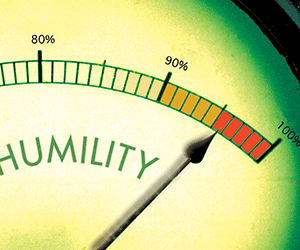by Midnight Freemason Contributor
R.W.B. Michael H. Shirley
“I believe that the first test of a great man is his
humility. I don't mean by humility, doubt of his power. But really great men
have a curious feeling that the greatness is not of them, but through them. And
they see something divine in every other man and are endlessly, foolishly,
incredibly merciful.” –John Ruskin
 Humility has a bad time of it in our society, in large
measure because it’s a quality misunderstood by most people. People think of it
as a willful disregard of one’s own ability, an abnegation of self that ignores
talent and achievement. It’s not. Humility is the act of taking oneself out of
the center of the universe, and recognizing that others are as deserving of
God’s love as we are, which is to say, not at all. It is the ability to make
requests, but not demands, for a demand is a way of saying “I am more important
than you are.” A Mason can’t make that claim, because we are all Brothers, living
on the level, with no man more important than another.
Humility has a bad time of it in our society, in large
measure because it’s a quality misunderstood by most people. People think of it
as a willful disregard of one’s own ability, an abnegation of self that ignores
talent and achievement. It’s not. Humility is the act of taking oneself out of
the center of the universe, and recognizing that others are as deserving of
God’s love as we are, which is to say, not at all. It is the ability to make
requests, but not demands, for a demand is a way of saying “I am more important
than you are.” A Mason can’t make that claim, because we are all Brothers, living
on the level, with no man more important than another.
It’s easy, in this hierarchical fraternity, to miss that
point. The Master who presides in the East is essentially a benevolent
dictator, with great power in his lodge. But the power inheres in his office,
not in him, and he forgets it at his peril. Once his term of office is expired,
the now Past Master has only such influence as inheres in him personally. As
Chris Hodapp puts it in his wonderful book, Freemasons
for Dummies, “the Worshipful Master goes from having all the power in the
lodge to having precisely none.” The Brother who rises to the Master’s chair is
supposed to have the wisdom to render his office effectively for the benefit of
his lodge, but his lodge is his Brethren, individually and collectively, and he
is no better in the sight of the Grand Architect of the Universe than they are.
The respect for his office is just that: respect for his office. He is not
called “Worshipful” because of any quality he possesses, but because of the
chair in which he sits. The Master is called to serve his lodge, not the other
way around.
One of the great privileges of my life has been hearing Most
Worshipful Brother Noel C. Dicks, Past Grand Master of Masons in Illinois, give
a speech to the Brethren assembled and to the new Master Mason after a Third
Degree (he lives about fifteen miles away from me, so I’ve heard it a lot). Every
time, he says something to the effect of, “you can join the Scottish Rite, the
York Rite, the Shrine, rise high in those appendant bodies, rise high in the
Blue Lodge, and maybe get one of these fancy aprons. But remember, we’re all
Brothers. There is nothing higher than the Third Degree. There is no greater
title than, ‘Brother.’”
Another great Past Grand Master, Most Worshipful Brother
Harry S. Truman, said something similar in his last month as President of the
United States: “It is fortunate that I’ve never taken an attitude that the
kudos and kow-tows are made to me as an individual. I knew always that the
greatest office in the history of the world was getting them, and Harry S.
Truman as an individual was not. I hope I’m still the country man from
Missouri.” Like Brother Dicks, Brother Truman understood humility, and lived
it. So may we all.
~MHS
R.W.B. Michael H. Shirley
serves the Grand Lodge of Illinois, A.F. & A.M, as Leadership
Development Chairman and Assistant Area Deputy Grand Master of the
Eastern Area. A Certified Lodge Instructor, he is a Past Master and
Life Member of Tuscola Lodge No. 332 and a plural member of Island City
Lodge No. 330, F & AM, in Minocqua, Wisconsin. He currently serves
the Valley of Danville, AASR, as Most Wise Master of the George E.
Burow Chapter of Rose Croix; he is also a member of the Illinois Lodge
of Research, the York Rite, Eastern Illinois Council No. 356 Allied
Masonic Degrees, Eastern Star, Illini High Twelve, and the Tall Cedars
of Lebanon. The author of several articles on British history, he
teaches at Eastern Illinois University.You can contact him at:
m.h.shirley@gmail.com








